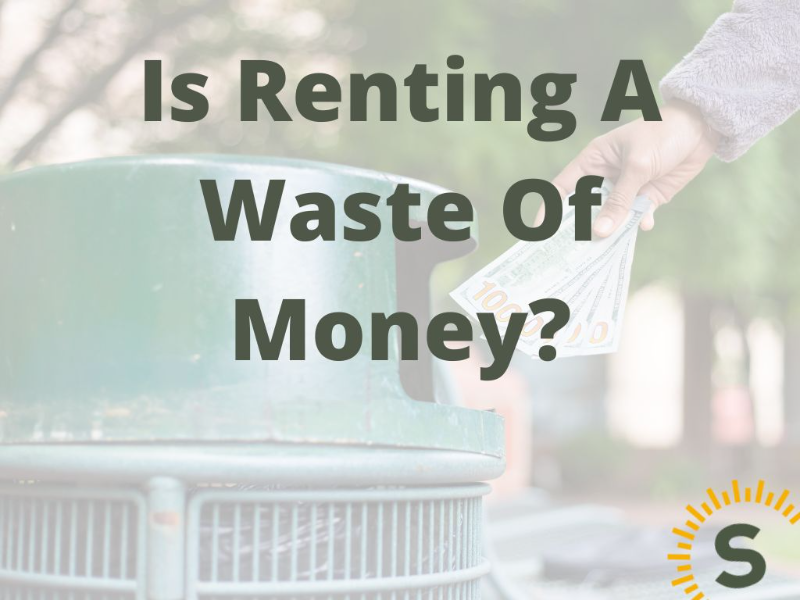
Property ownership has long been considered a status symbol and a key step towards financial stability. However, with soaring property prices, many individuals are left wondering: "Is renting a waste of money?" The answer isn't straightforward, and it depends on one's financial situation, lifestyle preferences, and long-term goals.
In this insight, we will explore the advantages and disadvantages of renting vs. buying a property, addressing common misconceptions and providing valuable insights to help you make an informed decision.
Renting is not a waste of money. Renting a home can provide numerous advantages, especially if you're content with your living situation. Rather than considering it a waste of money, renting offers the benefit of flexibility, minimal responsibilities for maintenance and repairs, and the freedom to relocate more easily.
If you are satisfied with your current living situation, viewing your home solely as an investment might not be necessary. While property ownership can offer financial benefits, it's important to prioritise your happiness and comfort in deciding whether to consider your home as an investment.
Renting provides flexibility in terms of location. If you enjoy the ability to explore different towns or have a mobile lifestyle that involves frequent travel, renting allows you to easily move from one place to another without the constraints of property ownership, making it a convenient choice.
Owning property can be a means to accumulate equity over time. By building equity, you have the potential to sell your property at a profit and use the proceeds to upgrade to a larger or more desirable property in the future, aligning with your evolving needs and preferences. However, it's important to acknowledge that this may not always be the case. The UK property market can experience fluctuations and there is no guarantee of continual value growth.
Ultimately, each person's financial circumstances and lifestyle preferences differ, so it's crucial to evaluate your specific situation and goals when making decisions about renting or owning property.
When considering whether it's better to rent or buy a property, one must take into account the financial aspects of both options. While renting might seem like a more expensive option in terms of monthly payments, there are additional costs associated with buying a property that renters don't have to worry about.
Renters are responsible for monthly rent payments, which vary depending on the location and size of the property. In addition, they may need to cover utility bills, council tax, and contents' insurance. However, maintenance costs are typically covered by the landlord, providing a sense of financial relief.
When buying a property, the initial costs can be quite substantial. These include a mortgage deposit, stamp duty, legal fees, and moving costs. Furthermore, property owners are responsible for ongoing expenses such as mortgage repayments, maintenance, and repairs.
For instance, if you were to buy a property worth £250,000 with a 5% deposit (£12,500), your monthly mortgage payments could be around £1,000, assuming a 25-year mortgage term. However, when you factor in the additional costs mentioned above, the total expenditure could be significantly higher.
Here's an example of a table that compares the growth of equity over time for a renter and a mortgage holder in pounds (£):
Year |
Renter (No Equity Growth) |
Mortgage Holder (Equity Growth) |
|---|---|---|
| 1 | £0 | £10,000 |
| 2 | £0 | £20,000 |
| 3 | £0 | £30,000 |
| 4 | £0 | £40,000 |
| 5 | £0 | £50,000 |
| 6 | £0 | £60,000 |
| 7 | £0 | £70,000 |
| 8 | £0 | £80,000 |
| 9 | £0 | £90,000 |
| 10 | £0 | £100,000 |
In this example, the "Renter (No Equity Growth)" column shows the renter's equity remains at £0 over the 10-year period. This reflects the fact that renting does not contribute to building equity, as rent payments do not go towards property ownership.
On the other hand, the "Mortgage Holder (Equity Growth)" column demonstrates the equity growth for a mortgage holder. Starting with an initial equity of £10,000, their equity increases by £10,000 each year, representing the gradual reduction of their mortgage balance.
Please note that this is a simplified example for illustrative purposes. In reality, equity growth can vary based on factors such as the property's market value, mortgage interest rate, loan term, additional principal payments, and market conditions. Additionally, this table does not consider factors such as property appreciation, maintenance costs, or potential rental price increases, which could impact the overall financial comparison between renting and owning a property.
Renting offers several advantages, such as flexibility, lower upfront costs, and reduced responsibility for property maintenance. However, there are also downsides, like the lack of control over the property and the inability to build equity.
Renting allows for greater mobility, making it an ideal option for those who may need to relocate for work or personal reasons.
Renting requires a smaller deposit compared to the substantial down payment needed when buying a property.
Renters are not responsible for property maintenance and repairs, as these are typically handled by the landlord.
Rent payments are generally fixed for the duration of the lease, making it easier to budget and plan for other expenses.
Renting may provide access to homes in more desirable areas that would be unaffordable to purchase.
Rent payments do not contribute towards property ownership, and renters do not benefit from potential increases in property value.
Renters have less control over property modifications and may need to seek permission from the landlord for changes or improvements.
Landlords may raise rent prices, which can cause financial strain for renters.
Renters may be asked to vacate the property when the lease ends or if the landlord decides to sell, leading to a lack of long-term stability.
Owning a property comes with its own set of advantages, such as building equity over time, having complete control over the property, and potential profit from property value increases. However, there are also downsides to consider, including the financial burden of maintenance, the long-term commitment to a mortgage and how to afford to buy a house.
Mortgage repayments contribute to property ownership, allowing homeowners to build equity over time.
If property values increase, homeowners may profit from the sale of their property.
Homeowners have full control over their property, including the freedom to make modifications and improvements as desired.
Owning a property provides a sense of long-term security and a place to call your own.
Once the mortgage is paid off, homeowners no longer have to worry about monthly rent payments.
Buying a property requires a substantial down payment, along with additional fees such as stamp duty and legal costs.
Homeowners are responsible for all property maintenance and repair expenses.
Buying a property requires a long-term mortgage commitment, which can be financially and emotionally burdensome.
If property values decrease, homeowners may end up owing more on their mortgage than the property is worth.
When comparing renting vs. buying, it's essential to consider your financial situation, lifestyle preferences, and long-term goals. If you value flexibility, have a limited budget for upfront costs, and prefer not to be responsible for property maintenance, renting may be the better option.
On the other hand, if you're in a stable financial position, plan to stay in one place for an extended period, and want to build equity, buying a property may be the right choice.
To get started with finding out how much you can borrow to buy a property you need to obtain a mortgage promise.
Renting is not a waste of money for those who value flexibility and lower upfront costs. It's essential to recognise that living in a property shouldn't always be considered an investment opportunity, but rather a place to call home and enjoy life.
When deciding between renting and buying, take the time to carefully assess your financial situation, lifestyle goals, and the property market in your area. By doing so, you'll be better equipped to make the best decision for your unique circumstances, ensuring long-term satisfaction with your living arrangement.

Stuart is an expert in Property, Money, Banking & Finance, having worked in retail and investment banking for 10+ years before founding Sunny Avenue. Stuart has spent his career studying finance. He holds qualifications in financial studies, mortgage advice & practice, banking operations, dealing & financial markets, derivatives, securities & investments.





Our website offers information about financial products such as investing, savings, equity release, mortgages, and insurance. None of the information on Sunny Avenue constitutes personal advice. Sunny Avenue does not offer any of these services directly and we only act as a directory service to connect you to the experts. If you require further information to proceed you will need to request advice, for example from the financial advisers listed. If you decide to invest, read the important investment notes provided first, decide how to proceed on your own basis, and remember that investments can go up and down in value, so you could get back less than you put in.
Think carefully before securing debts against your home. A mortgage is a loan secured on your home, which you could lose if you do not keep up your mortgage payments. Check that any mortgage will meet your needs if you want to move or sell your home or you want your family to inherit it. If you are in any doubt, seek independent advice.